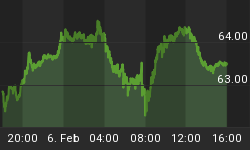Economists are now arguing over whether it will be a hard or soft landing for the U.S. economy. The fact that a landing will occur is no longer debatable. Empirical evidence demonstrates that the fragile U.S. economy is growing weaker with each passing piece of government data. Anemic GDP, durable goods, Chicago PMI, ISM-Manufacturing, and Factory orders, along with rising unemployment claims are suggesting that the Fed will stimulate the economy with yet more liquidity in 2007. The Fed and the economy/market may find itself in a box next year -- a Bernanke Box -- one that puts the economy squarely at odds with the dollar.
The Fed's mandate is to maintain dollar stability. However, they may have to decide in 2007 whether to rescue a falling currency by hiking rates or to lower rates in order to stave off a recession. Which posture they take will have major ramifications for the bond, stock market and the economy.
We are all aware of the reasons for the long term negative outlook for the U.S.D. There is the trade deficit mandating we entice foreigners to commit 2 billion dollars per day into our markets in order to maintain dollar stability. In addition, the total U.S. debt is now over $8.6 trillion. This debt has allowed China to hold $1 trillion in foreign reserves (70% of reserves in U.S. dollars). Chinese officials have recently expressed an interest to diversify their dollar holdings. According to Bloomberg, foreigners now hold nearly 50% of our publicly traded debt. The major holders of our debt are Japan, China and the U.K. They currently hold 639.2, 342.1 and 207.8 billion dollars of our treasury debt respectively. In all, foreigners hold about $9 trillion of U.S. financial assets.
The U.S. has developed a dependency and an addiction to these foreigners who hold our dollar and subsequently our economy hostage. Former President Clinton's Treasury Sec. Robert Rubin said in November, "The U.S. is five years away from rapid acceleration of spending tied to Social Security and Medicare." At the same time the esteemed former Fed head Paul Volcker proclaimed, "It's incredible people have gone on so long holding dollars." and was unwilling to extend a prediction of a dollar crisis in the next two and one half years. Trustees from the Medicare and Social Security trust funds estimate that 26.6% of Federal income taxes will be needed to fulfill obligations in 2020, up from 6.9% today. By 2030 that number will increase to 49.7%. Bear in mind the U.S. has a negative saving rate, which further underscores our reliance on oversees borrowing.
So the Fed must appease foreign holders and prospective buyers of our treasuries by offering higher relative yields. That interest rate advantage the U.S. currently holds is expected to decline in '07 as central banks in Europe and Japan raise rates. With real rates of return after taxes in negative territory, bonds currently offer little investment value. It will not be an easy task to attract foreign buying especially in light of our falling currency. If Mr. Bernanke decides to raise rates, it should bolster the dollar short term but at the same time crater a housing market that is on life support and drive the economy into a deep recession, which may still prove pernicious for the currency in the longer term. Or, he may choose to rescue the economy by cutting rates that should provide short term stimuli for the economy and the markets but could engender a dollar crisis. The latter may send foreign holders of our dollar denominated assets to flee, sending bond and stock prices much lower.
It is my contention that the Fed will attempt to keep the Fed Funds rate at 5.25% and talk about the dangers of a falling dollar and inflation. Concurrently, while ostensible appearing to be an inflation hawk, they will monetize newly issued treasury debt and flood the economy with new money. If successful, they may delay the dollar's ultimate fate and bolster the faltering economy. The above balancing act is very difficult to pull off and can be only temporary in nature. For investors, keep a close eye on economic data and especially Friday's non-farm payroll data. If weaker than expected (layoffs from the decline in the housing market should suppress the number), look for a further sell-off in the dollar while the stock market supplicates for a rate cut. And look for Mr. Bernanke's balancing act to become a bit more precarious.
**Speaking of U.S. Dollar hedges, we have the exclusive right to bring you a special report on the recent Canadian royalty trust tax announcement from Roger Conrad, one of the leading commentators on this industry. His report contains a discussion of many individual energy trusts and can be downloaded here: http://www.deltaga.com/reportForm.asp?rep=4.















